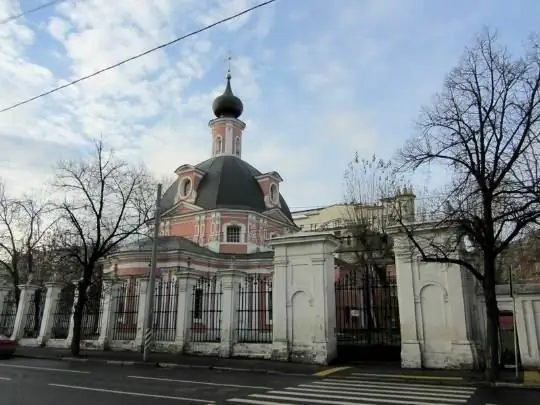
Description of the attraction
The Church of St. Catherine the Great Martyr was a wooden suburb church. Its existence has been known since the 16th century. The church was thoroughly rebuilt after 1762, when Catherine II arrived in Moscow for the coronation. The Empress herself wished to build a temple in honor of her heavenly patroness, allocated funds from the treasury for this, presented the church with expensive gifts. She attracted to its construction and decoration masters of their craft - the architect Karl Blank, who built several churches and an Orphanage in Moscow, as well as the artists Dmitry Levitsky and Vasily Vasilevsky, who painted icons for the iconostasis, unfortunately, not preserved.
After Catherine's participation in the fate of the temple, the church began to represent two buildings, old and new (winter and summer temples), which were connected by a bell tower in two tiers. The architect Karl Blank managed to catch the decline of the Baroque period and the beginning of Classicism. The Catherine Church is one of the last examples of the Moscow Baroque. The building was surrounded by a fence, which consisted of figured elements of the fence of the Cathedral Square of the Kremlin, which was dismantled in the 40s of the 18th century, and by order of Catherine was used for the renovated church. In the 19th century, the appearance of the church was restored twice - after a fire in 1812, and in the 1870s the old building was rebuilt.
In the early 30s of the last century, the church was closed. Its main icon, St. Catherine, was lost during the Soviet era. After the church was closed, it was moved to Monetchiki, to the Church of the Resurrection, but that temple was not only abolished, but also destroyed. The shrine moved to Zatsepa, to the Church of Flora and Lavra, also closed, and the further fate of the icon cannot be traced.
In the 30s, living quarters were arranged in the old building of the church, office rooms in Catherine's, but then the former church changed its "guests". They were the Research Institute and the All-Union Art Restoration Center named after Igor Grabar, which in the 80s carried out the restoration of this building.
In the 90s, only part of the church was returned to the Russian Orthodox Church. Today the church is the representative office of the Orthodox Church in America under the Moscow Patriarchate.






